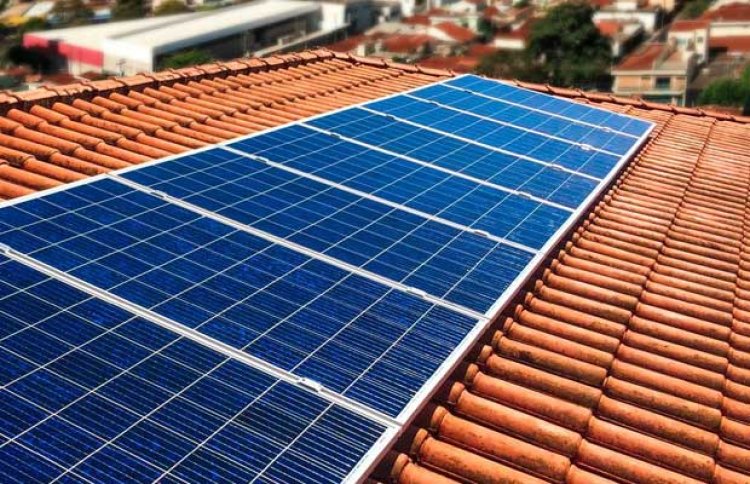How Much Does Rooftop Solar Panels Cost in India, 2024
This article delves into the intricacies of rooftop solar panel cost in India, shedding light on the various components that make up the expenses and the potential long-term benefits.
Share this Post to earn Money ( Upto ₹100 per 1000 Views )

With a rapidly growing population, increasing urbanization, and a surge in electricity demand, it's imperative for the country to explore sustainable and renewable sources of energy. Solar power, in particular, has emerged as a frontrunner in the race to meet India's energy needs while reducing the environmental footprint. However, one crucial factor that concerns potential solar adopters is the cost. This article delves into the intricacies of rooftop solar panel cost in India, shedding light on the various components that make up the expenses and the potential long-term benefits.
Understanding the Components of Rooftop Solar Panel Costs
-
Solar PV Modules
Solar PV Modules, the heart of any photovoltaic system, constitute a significant portion of the total cost. The price of solar panels in India varies depending on several factors, including the type, efficiency, and brand. Polycrystalline panels, monocrystalline panels, and thin-film panels are among the options available. Monocrystalline panels, although more expensive, are known for their higher efficiency and longer lifespan.
-
Inverters
Inverters are essential components that convert the direct current (DC) generated by the solar panels into alternating current (AC) that can be used to power homes and businesses. The cost of inverters in India can vary significantly depending on the capacity and type. String inverters, microinverters, and hybrid inverters are the common types. Microinverters are pricier but offer improved efficiency and individual panel performance monitoring. Inverter prices in India generally range from INR 6,000 to INR 15,000 per kilowatt (kW) capacity.
-
Mounting Structure
The mounting structure, which secures the Rooftop Solar Panel, is another important component. The cost of the mounting structure depends on factors such as the type of roof (flat or sloped), the material used (aluminum or galvanized steel), and the number of panels to be installed. On average, the mounting structure can account for around 10% to 15% of the total installation cost.
-
Balance of System (BoS) Components
The balance of system (BoS) components includes wiring, cabling, junction boxes, fuses, and other electrical and mechanical equipment required to connect the solar panels to the inverter and the grid. These components typically account for 10% to 15% of the total cost.
-
Installation and Labor
Installation and labor costs are a significant part of the overall expense. The cost of labor can vary by location and the complexity of the installation. In India, installation costs typically account for 15% to 20% of the total cost of a rooftop solar system.
-
Miscellaneous Costs
Miscellaneous costs encompass expenses like obtaining necessary permits and approvals, as well as insurance for the solar system. These costs are relatively small but should not be overlooked.
Government Subsidies and Incentives
To promote the adoption of rooftop solar panels in India, both central and state governments have introduced various incentives and subsidies. As of 2021, the Central Financial Assistance (CFA) provided by the Ministry of New and Renewable Energy (MNRE) can cover up to 40% of the total cost of the system in certain cases. Additionally, many states offer net metering policies, wherein surplus energy generated by the solar system can be fed back into the grid, offsetting electricity bills.
Return on Investment (ROI) and Long-Term Savings
While the initial cost of installing rooftop solar panels in India may seem substantial, it's essential to consider the long-term savings and return on investment. Solar panels have a lifespan of 25 to 30 years, during which they generate electricity essentially for free. This translates to significant savings on your electricity bills over the years. Additionally, the reduced dependence on conventional grid electricity can shield you from rising electricity costs.
The exact ROI varies depending on factors like the size of the system, solar panel efficiency, and local electricity rates. On average, homeowners in India can expect an ROI of 3 to 5 years, with the system paying for itself in this period. After the payback period, the electricity generated by the solar panels is essentially free, providing substantial savings.
Environmental Benefits
Beyond the financial savings, rooftop solar panels offer substantial environmental benefits. Solar power is a clean and renewable energy source that reduces carbon emissions and lessens the reliance on fossil fuels. By installing solar panels, you can contribute to a greener and more sustainable future, reducing your carbon footprint.
Challenges and Considerations
-
System Sizing: It's essential to determine the right size for your solar panel system to maximize cost savings. An oversized system may have a longer payback period, while an undersized system might not meet your electricity needs.
-
Quality Matters: Choosing high-quality components and experienced installers is crucial. Substandard panels or poor installation can lead to maintenance issues and reduced system efficiency.
-
Shading: Ensure that the installation site is not shaded by nearby buildings or trees, as shading can significantly reduce the system's efficiency.
-
Maintenance: While solar panels are relatively low maintenance, periodic cleaning and maintenance are necessary to ensure optimal performance.
Conclusion
Rooftop solar panels offer a promising solution to India's growing energy demands while mitigating the environmental impact of conventional power sources. While the upfront costs can be a concern, government incentives and the long-term financial and environmental benefits make solar panel installations a viable investment. As technology advances and the solar market in India matures, it's likely that the cost of rooftop solar panels will continue to decrease, making them an even more attractive option for both residential and commercial users. Therefore, it's essential for those considering solar panel installation to conduct thorough research, evaluate the available incentives, and choose a reliable provider to harness the power of the sun and secure a brighter, more sustainable future.








